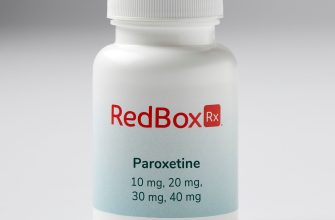If your healthcare provider has prescribed Topamax for migraines or epilepsy, clear guidance can make the process smoother. First, make sure to ask about the correct dosage tailored to your needs. Starting with a lower dose and gradually increasing it can help minimize potential side effects.
Document any side effects you experience, whether they are mild or severe. Common issues include dizziness and fatigue, but every individual may respond differently. Keep a journal to track how you feel after each dose, which can be a helpful resource for your doctor during follow-up appointments.
Stay informed about interactions with other medications you may be taking. It’s essential to discuss this with your healthcare provider, as some drugs can affect the efficacy of Topamax. Your doctor can help you navigate any potential complications.
Consider lifestyle factors that may influence your treatment. Staying hydrated, maintaining a regular schedule for meals, and avoiding alcohol can support the medication’s effectiveness. Small adjustments in your daily routine can yield significant benefits in managing your condition.
- Topamax Prescription Help
- Understanding Topamax: Uses and Benefits
- Epilepsy Treatment
- Migraine Prevention
- Recognizing Who Can Benefit from Topamax
- Navigating the Prescription Process for Topamax
- Common Side Effects of Topamax to Watch For
- Gastrointestinal Issues
- Cognitive Effects
- Other Notable Effects
- Managing Dosage and Administration of Topamax
- Administration Tips
- Monitoring and Adjustments
- Strategies for Discussing Topamax with Your Doctor
- Questions to Consider
- Discussing Concerns
- Resources for Ongoing Support and Information about Topamax
- Educational Websites
- Support Groups
Topamax Prescription Help
Consult your doctor about the appropriate dosage of Topamax for your condition. Typical starting doses are often low, allowing for gradual adjustments based on tolerance and response. Regular follow-ups ensure the treatment remains effective.
Discuss potential side effects with your healthcare provider. Common issues include dizziness, fatigue, and cognitive changes. Understanding these can help you manage them if they arise. Notify your doctor immediately if you experience severe side effects, such as mood changes or visual disturbances.
Inform your doctor about your medical history, especially if you have kidney issues, mood disorders, or a history of metabolic acidosis. Topamax may not be suitable for everyone, and your healthcare provider will tailor the treatment to your specific needs.
If you’re pregnant or planning to conceive, discuss the implications of using Topamax. This medication has been linked to certain risks during pregnancy, and your doctor can help weigh the benefits against potential risks.
Keep a medication schedule to avoid missed doses. Taking Topamax consistently at the same times each day can help maintain stable levels in your bloodstream, enhancing its effectiveness.
Consider lifestyle adjustments that complement your treatment. Staying hydrated is important, especially since Topamax can increase the risk of kidney stones. A well-balanced diet can also support your overall health while on this medication.
Engage with support groups or online communities for additional insights and shared experiences. Hearing from others who manage similar conditions can provide encouragement and practical tips for living with Topamax.
Lastly, maintain open communication with your healthcare provider throughout your treatment. Any concerns, questions, or new symptoms should be addressed promptly, ensuring you receive the best possible care while using Topamax.
Understanding Topamax: Uses and Benefits
Topamax (topiramate) is primarily prescribed for managing epilepsy and preventing migraines. It reduces the frequency of seizures by stabilizing electrical activity in the brain. Patients often report fewer migraines and a decrease in their severity while using this medication.
Epilepsy Treatment
For individuals with epilepsy, Topamax acts as an anticonvulsant. It helps by inhibiting certain signals in the brain that lead to seizures. Many healthcare providers recommend it for both adults and children due to its effectiveness. It’s essential to follow prescribed dosage schedules to achieve optimal results.
Migraine Prevention
Topamax is also beneficial for those struggling with frequent migraines. Studies indicate that it can significantly reduce the number of migraine attacks per month. Patients may experience a reduction in headache duration and intensity. Staying consistent with the medication and reporting any side effects to a healthcare professional can enhance safety and effectiveness.
In addition to its primary uses, some patients find Topamax aids in weight loss as a secondary benefit. Those seeking this as an adjunctive therapy should discuss it with their doctor, as it may not be suitable for everyone. Staying informed and communicating openly with healthcare providers leads to better management of conditions and overall health improvement.
Recognizing Who Can Benefit from Topamax
Topamax is an effective treatment option for individuals suffering from epilepsy and migraines. Patients experiencing frequent migraine attacks, especially those who have not found relief with other medications, may find this drug particularly helpful. It works by stabilizing neuronal activity, thereby reducing the frequency and severity of seizures and migraine episodes.
Individuals with a history of episodic migraines can benefit significantly. If you have at least four migraine days per month, consider talking to your healthcare provider about Topamax. Those diagnosed with chronic migraine may also experience improvements, especially if other preventative medications have proven ineffective.
Topamax may also assist patients with specific weight management issues, particularly those who experience weight gain as a side effect of other medications. This drug has shown potential in promoting weight loss, making it an option worth exploring for individuals seeking to manage their weight more effectively.
Additionally, patients struggling with mood disorders such as bipolar disorder may discover benefits. Topamax can contribute to mood stabilization, particularly in combination with other treatments, providing an added layer of support in managing symptoms.
Before starting Topamax, discuss your complete medical history with your doctor, including any existing conditions or medications you’re currently taking. This will ensure that Topamax is right for you and help create a tailored approach to your treatment.
Listening to your body’s responses after starting treatment is equally crucial. If you notice significant changes in your migraine patterns, seizure occurrences, or weight, keep your healthcare provider informed. Regular check-ins can lead to the best outcomes.
Navigating the Prescription Process for Topamax
Consult your healthcare provider to discuss your symptoms and medical history. Be clear about your experiences with headaches, migraines, or seizures, as this will help in assessing your need for Topamax. Bring a list of current medications to avoid potential interactions.
Request a comprehensive evaluation. Your doctor may suggest tests or assessments to confirm the appropriate diagnosis. This step is crucial for determining if Topamax is the right choice for you.
If your healthcare provider prescribes Topamax, ask about the correct dosage and administration guidelines. Understanding how and when to take the medication enhances its effectiveness and minimizes side effects.
Inquire about possible side effects. Awareness of common and serious reactions enables you to monitor your body’s response to the medication. Discuss any concerns you have about these effects with your doctor.
Verify insurance coverage for Topamax or check available assistance programs if you face financial challenges. Many pharmaceutical companies offer patient assistance, which can help reduce out-of-pocket costs.
Schedule follow-up appointments to assess the medication’s effectiveness and manage any side effects. Regular communication with your healthcare provider fosters a supportive treatment environment.
If you encounter issues or experience adverse effects, notify your doctor immediately. Adjustments to your treatment plan may be necessary to ensure your well-being.
Lastly, maintain an open dialogue with both your provider and pharmacist regarding any questions or changes in your health status. This ongoing communication guarantees a more personalized approach to your treatment journey.
Common Side Effects of Topamax to Watch For
Monitor for the following side effects while using Topamax. Being aware can help you address issues early.
Gastrointestinal Issues
- Commonly, patients report nausea and diarrhea.
- Maintain hydration and consult a healthcare provider if symptoms persist.
Cognitive Effects
- Look out for difficulties with concentration or memory.
- Some individuals experience word-finding issues, often referred to as “word-finding difficulty.”
- Report these changes to your doctor promptly, as adjustments in dosage may help.
Other Notable Effects
- Fatigue can occur; consider modifying activity levels if needed.
- You may notice changes in taste or experience tingling sensations in the limbs.
- Allergic reactions and mood changes, though less common, require immediate medical attention.
Keep track of any side effects you experience and discuss them during follow-up appointments to ensure optimal management of your treatment plan.
Managing Dosage and Administration of Topamax
Begin with a low dose of Topamax, typically 25 mg per day for adults. This gradual increase helps reduce the risk of side effects. Your healthcare provider will adjust your dosage based on your response to the medication, often increasing it by 25 to 50 mg weekly. Achieving the optimal therapeutic dose may take time and requires regular follow-ups.
Administration Tips
Take Topamax with or without food, but maintain consistency in how you take it each day. Swallow capsules whole; do not break or chew them. If you miss a dose, take it as soon as you remember, unless it’s close to the time for your next dose. Avoid doubling up on doses. Hydration is key; drink plenty of fluids to prevent kidney stones, a possible side effect of Topamax.
Monitoring and Adjustments
Your doctor may recommend regular blood tests to monitor how you are reacting to Topamax. This helps ensure that any necessary adjustments occur promptly. Report any side effects, such as mood changes or cognitive issues, to your provider immediately for assessment. Regular communication about your experience aids in tailoring your treatment plan effectively.
Strategies for Discussing Topamax with Your Doctor
Prepare a list of your symptoms and how they affect your daily life. Include any triggers or situations that worsen your condition. This helps your doctor understand the context and severity.
Research Topamax thoroughly. Familiarize yourself with its uses, potential side effects, and any interactions with other medications you take. This empowers you to ask informed questions during your appointment.
Questions to Consider
- What specific conditions can Topamax help manage for me?
- What are the expected benefits and potential side effects?
- How should I take Topamax, and what schedule do you recommend?
- Are there any dietary or lifestyle changes I should make while on this medication?
- What alternatives to Topamax do you suggest if I cannot tolerate it?
Be open about your medical history. Disclose past medication experiences, allergies, and current health issues. This information aids in tailoring a suitable treatment plan.
Discussing Concerns
Express any worries you may have regarding Topamax. This might include side effects, how it interacts with your lifestyle, or fears about long-term use. Understanding your concerns allows the doctor to address them effectively.
Lastly, consider bringing someone with you to the appointment. A second person can help remember information discussed and provide support. After your visit, review the treatment plan to ensure clarity on how to proceed.
Resources for Ongoing Support and Information about Topamax
For individuals prescribed Topamax, several resources can provide valuable information and support. First, consider joining online forums dedicated to discussions about medications, including Topamax. These platforms allow patients to share experiences and strategies for managing side effects.
Educational Websites
Websites like Drugs.com and WebMD offer detailed information on Topamax, including dosage guidelines, potential side effects, and interactions. These resources can help expand your understanding and ensure safe use.
Support Groups
Connect with support groups, both online and in-person, where you can engage with others facing similar challenges. Groups such as the National Alliance on Mental Illness (NAMI) provide a space for sharing insights and encouragement.
| Resource Type | Example | Website/Contact |
|---|---|---|
| Forum | Topamax Support Group | www.topamaxforum.com |
| Educational | Drugs.com | www.drugs.com/topamax.html |
| Support Group | NAMI | www.nami.org |
| Medication Information | WebMD | www.webmd.com/drugs/2/drug-6776/topamax-oral/details |
Consult your healthcare provider for personalized advice tailored to your situation. They can offer additional resources and investigate specialized support programs if needed. Regular communication with your doctor enhances your treatment journey.









